We learned this week that our 9yo female domestic cat FIV+ has bilateral ear canal polyps more severe on the right. Our local vet does not perform the surgical removal of these polyps. How to find a vet to perform surgery or a dermatology specialist? A video otoscopy was recommended. In Maryland, Harford County. Willing to travel though don’t want to stress cat out too much with a looonnggg ride. Thanks in advance.
My 2 yr old springer sleeps with me but some nights she is on the bed off the bed which means my sleep is interrupted. Why is she doing this as she doesn’t want out.
Comments
Can a cat live with a nasopharyngeal polyp that is not easily removed (it’s not near soft palette when placed under anesthesia)? Our 6 yr old spayed female is honking and has nasal discharge unless she is on antibiotics. Prednisone /prednisolone were not effective.
She is a poor surgical candidate (she stopped breathing when the endotracheal tube was removed during exploratory). An ear polyp was removed successfully. Discharge and ear polyp are/we’re on the same side.
We cannot afford endoscopy at this time. Can she be maintained on antibiotics? She has coughed up a large polyp twice before we owned her so we are hopeful that will happen again soon.
Hello,
My cat was cleared from urinary blockage.
Now we need to prevent this from recurring.
You mentioned quality can food for this.
If you can give me a list of your favorite quality cat can foods I would appreciate that.
Thank you
Colin to Dr. Krista : May I pick your Brains?
Dear Dr. Krista,
I’m writing to ask your advice about a stray cat I found last month. See images attached.
But first I want to thank you for the polyp videos you made, which were refreshing, as well as impressive.
One of my strays was snoring, so I was eager to pluck out a polyp hiding behind his soft-palate. (He didn’t have one, but I’m gratefully alerted for the future.)
Last month I found a stunted stray ginger cat outside a 7/11 in North Thailand, where I’m a self-financed Christian missionary.
Can you help me diagnose, and treat the problem?
At first I thought it was simply FVR / Calici and chronic snuffles.
But when I opened her mouth, she had only 4 teeth in her head!
Yes, she had calici tongue-ulcers, but little sneezing, no ocular discharge, and has been eating like a horse from day one. She’s happy and bright in herself, apart from the ugly sore nose.
Her mandibular Ln were big and hard, so I put her on antibiotic tablets, with a little dexamethasone (actually 2.5mg Prednisolone tab. daily.)
Then after a week or so I sedated her, and examined her mouth more closely, no observable polyps (drat!) but one of her molars was loose and covered in calculus, so I pulled that one out, and cleaned up the remaining molar and two premolars, otherwise the poor thing would have zero teeth.
There was of course gingivitis and pharyngitis, but pink, not red like “dragon-mouthed cats” on dcf.
For the last month I’ve given her a course of floxacilin (30 days) with amoxycillin, and tried all sort of creams on her nose and lower eyelids which. as you can see, are raw and sore.
Her Ln are almost normal now, +but that nose is no better+, and she tries to rub as though it is itchy.
(I made up creams mixing; 10% flours of sulphur, betamethasone, ivermectin, and vaseline)
There’s a temporary lessening at best, but no lasting improvement.
So what is your differential for her?
In NZ where I locummed, cat leprosy was common (Mycobacterium from mice and voles) so that was my diagnosis, but the floxacillin has made no impression.
I’ve trimmed her claws and taped her fore paws to stop her making her nose raw.
I’m stuck, and thought of asking you Doc.
I’d guess she’s 3-4 years old, confident, unvaccinated, entire, lived wild all her life eating left over fast food, and possibly DCF from neighbours.
Since October I’ve been feeding her raw chicken frames, tinned sardines, vitamin syrup, and no DCF.
She loves raw chicken :), and eats whatever I put in front of her and still looks for more.
Apart from her nose you would not think she was ill in any way.
Thanks for your advice.
Colin
PS. For some reason, Depo-medrone has been taken off the market here, not even local vets can get hold of it.
Colin Melbourne English missionary in Asia
https://www.born-again-christian.org/news/
https://www.born-again-christian.org/news/ไทยคริสเตียน/
https://www.born-again-christian.info/aboutus.htm
https://www.born-again-christian.com (Asian languages)
Comments
Hi Krista,
I discovered your YouTube videos yesterday and found your advice on cat care incredibly helpful. My wife and I are caring for our 18-year-old Birman cat, who is in stage 4 kidney disease with significant muscle loss. She’s also struggling with constipation and has other health issues, including high blood pressure and a heart murmur.
Currently, we’re feeding her a mix of wet food (chicken broth, chicken, pumpkin, and egg yolk), and providing SubCut fluids (50ml/day), along with the following supplements:
– Epakitin (0.5g/day)
– Pet-Tinic (2ml/day)
– Lactulose (3ml/day)
– Phos-Bind (0.2g/day)
– Potassium chloride (0.19g/day mixed in the broth – though we’re concerned she’s not getting the full amount since she’s unable to finish the broth).
– In addition, she’s on Amlodipine (0.25ml/day) to manage her high blood pressure.
Despite this, her weight has decreased significantly over the past year. She was once 3.3kg, but a year ago dropped to 2.5kg, and three weeks ago, it dropped again to 1.8kg, despite our best efforts to feed her.
A week ago, we had an enema done at the vet, which relieved some diarrhea, but there was still hardened stool near her anus. We’ve been massaging her abdomen and anus daily to stimulate defecation, and were able to help her pass a large, hard stool last Wednesday. Since then, she’s only passed small amounts of stool – mostly liquid or dark – and has had a lot of difficulty.
Today, we used a Pedia-Lax suppository (1ml), and after about 30 minutes, she passed a larger stool with dark liquid diarrhea. The stool was slightly hard, dark, and very smelly. She’s now very exhausted and resting, but did purr a bit before falling asleep.
For hydration, I gave her 10ml of SubCut fluids before the suppository to prevent dehydration. We’ve seen three different vets, but none have been able to provide lasting relief.
We’re reaching out for advice on whether we’re on the right track and if there’s anything else we can do to help her feel better and poop more easily. Any suggestions, given the circumstances, would be greatly appreciated.
Thank you so much for your time and any guidance you can offer.
Warm regards,
Joel and Sonia
Comments
Hello. My 4 year old male cat had a urinary blockage they did a catheter and unblocked him sent him home and he wasn’t getting better 2 days later took him back and now he has a bladder infection. Sent us home with Amoxocillin. Took him back to er and now he is blocked again. Another catheter is in. My question is if they pull the catheter will he block again due to the bladder infection he still has? My thoughts are can they leave it in longer and keep the urine flowing until his badder infection clears? Lastly the urine culture hasn’t been verified yet to know exactly what antibiotic is needed apparently that takes a week. They just guess Amoxocillin. Please let me know your thoughts.
Comments
My senior, male, neutered, diabetic nebelung cat is experiencing constipation, I had recently slowly changed his diet to a raw based diet from royal Canon diabetic pouches,, as i was put off from the vet scientific diabetic diets in the end due to one day reading the ingredients and seeing that my cat was needing something more or potentially he was lacking something, I say this as he was starting to mirander outside like a Billy goat eating all the graass that he could in our backyard. Coincidently, Boof started flickng his head and scratching at his ears, the next day after noticing his discomfort and that he still hadn’t defecate (day 3) i took him to a neighboring vet as our usual vet was fully booked out, I could see crusty brown specs in his ear and a discharge, the vet I took him to gave, me pmp drops to administer 3 drops per ear twice daily for 7 days. She didn’t want to try to much else due to him being a diabetic and also a new patient,
One day later when I was cleaning boofs bedding a spider
Like bug had come out onto our carpet,
I took a photo of it,
It’s definitely some type of tick not sure if it cpmr from out of his ear or if it has anything to do with his constipation.
Boofs appetite has been great this whole time aswel.
Although after eating I have noticed him somewhat whining ND groverling like his pain 🙁
He also vomited twice after having dinner. (biley foaming substance liquid)
On day 5 I took vet into out normal vet who assessed him, she gave him a 24hour anti nausea injection, and assessed him, she said to resume giving lactolose maybe a little bit more and aswel with the subcut fluids,
And still nothing,….
The vet called today to see how Boof was I explained to her that he wants to go to the toilet but just can’t, and his looking pretty squeamish again,
She explained to me that because of it being 6days now with no bowel movements that it can get Boof pretty sick potentially, she explained that instead of taking a stab in the dark and guess that they would breed to take xrays ect bloods and mannualyl remove all feces that’s stuck in him and it would cost $800. Due to Christmas coming up and the overall rise in the cost of living and the renting crisis here, I am just stuck for money at the moment that kills me to say, I have tried vet pay with. No luck…
Is there anything I can try at home please, it’s not at all a situation where I don’t want to pay anyone, it’s by far the opposite and I’m hoping that a friend of family member will reply to me after asking for a lend, which I never do, and I never would expect or be suprised if anyone can help,
My boy means so much to me,
I just gave Boof a 5ml enema of lactulose and more subcut fluids
Is there anything more that I can do please 🙁 🙁
Comments
My cat got a large lump under his jaw that formed over night. The vets are closed and the emergency vet is too far and expensive. My parents say they will take him monday but is it safe to leave it untreated for two days? *edit, i should mention the lump is large and does not seem to be causing pain, he is acting normal anyway. I cant tell if its warm or not thou
Comments
Hi. I’m asked by our vet to slowly wean my cat off her 2.5 mg prednisolone. I’ve done half dose for a couple of days and started alternate days three days ago. Noticed that my cat started having loose stools yesterday and today. Is this a side effect of the weaning off process? Tks.




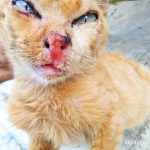
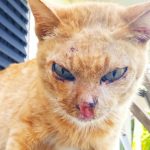
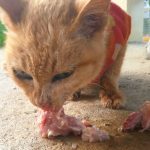
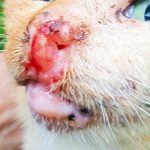
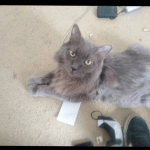
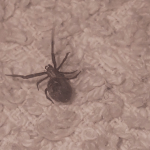
I would imagine something keeps her up. Just like humans. Does she have a bed in your room and a reliable command to park her butt somewhere? Perhaps putting her there if she won’t settle is a way to handle it?
thanks Laura. I had thought of putting one of her beds in my room which I will do tonight and see how it goes. Perhaps I snore which may upset her.
Hello,
I would guess because your dog is their own person. They have their own wants, needs, thoughts and desires. Maybe she’s too hot, or you snores, or you talk and tell in your sleep. Oh wait. That’s my husband. If he ever asks why my sleep is interrupted answer the same. You can put a camera on yourself at night and see if any of my ideas pertain.